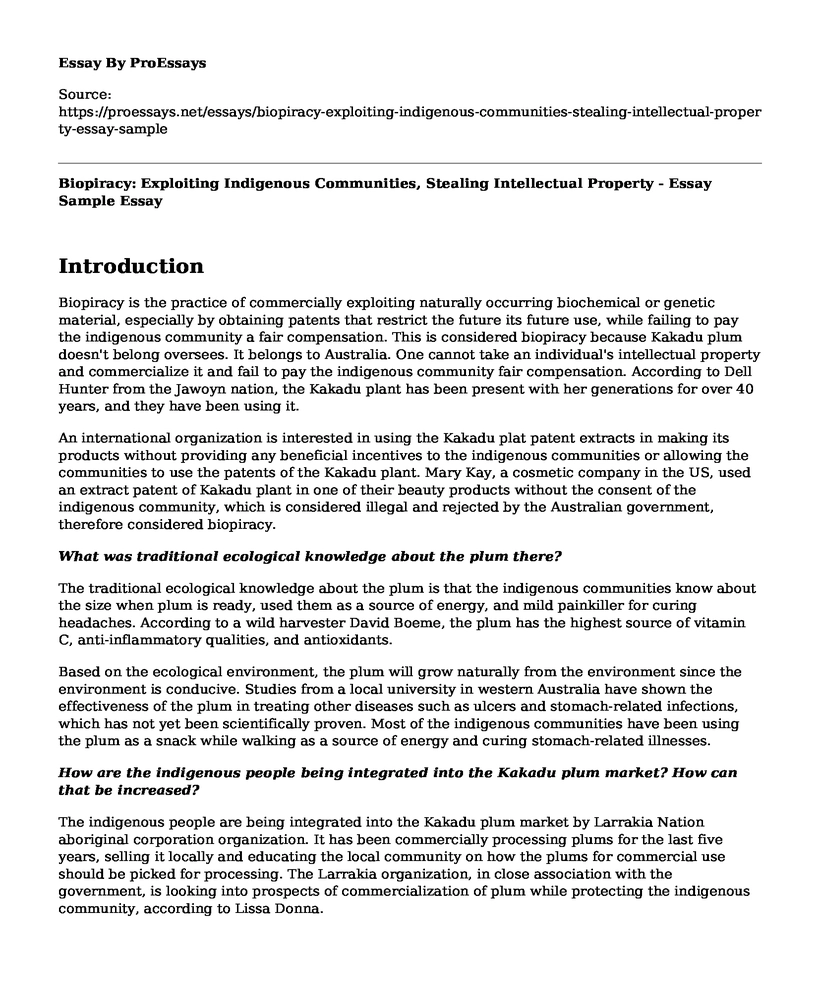Introduction
Biopiracy is the practice of commercially exploiting naturally occurring biochemical or genetic material, especially by obtaining patents that restrict the future its future use, while failing to pay the indigenous community a fair compensation. This is considered biopiracy because Kakadu plum doesn't belong oversees. It belongs to Australia. One cannot take an individual's intellectual property and commercialize it and fail to pay the indigenous community fair compensation. According to Dell Hunter from the Jawoyn nation, the Kakadu plant has been present with her generations for over 40 years, and they have been using it.
An international organization is interested in using the Kakadu plat patent extracts in making its products without providing any beneficial incentives to the indigenous communities or allowing the communities to use the patents of the Kakadu plant. Mary Kay, a cosmetic company in the US, used an extract patent of Kakadu plant in one of their beauty products without the consent of the indigenous community, which is considered illegal and rejected by the Australian government, therefore considered biopiracy.
What was traditional ecological knowledge about the plum there?
The traditional ecological knowledge about the plum is that the indigenous communities know about the size when plum is ready, used them as a source of energy, and mild painkiller for curing headaches. According to a wild harvester David Boeme, the plum has the highest source of vitamin C, anti-inflammatory qualities, and antioxidants.
Based on the ecological environment, the plum will grow naturally from the environment since the environment is conducive. Studies from a local university in western Australia have shown the effectiveness of the plum in treating other diseases such as ulcers and stomach-related infections, which has not yet been scientifically proven. Most of the indigenous communities have been using the plum as a snack while walking as a source of energy and curing stomach-related illnesses.
How are the indigenous people being integrated into the Kakadu plum market? How can that be increased?
The indigenous people are being integrated into the Kakadu plum market by Larrakia Nation aboriginal corporation organization. It has been commercially processing plums for the last five years, selling it locally and educating the local community on how the plums for commercial use should be picked for processing. The Larrakia organization, in close association with the government, is looking into prospects of commercialization of plum while protecting the indigenous community, according to Lissa Donna.
This can be increased by encouraging the community to mass-produce Kakadu plums for commercial use and providing the necessary resources for research and protecting the interests of the indigenous community and making sure they benefit from the Kakadu community.
The market of the Kakadu plum is already present due to the endless uses of the plum. The Australian government should encourage local commercialization by educating local communities on better processing methods and care of the Kakadu plant.
Cite this page
Biopiracy: Exploiting Indigenous Communities, Stealing Intellectual Property - Essay Sample. (2023, Aug 12). Retrieved from https://proessays.net/essays/biopiracy-exploiting-indigenous-communities-stealing-intellectual-property-essay-sample
If you are the original author of this essay and no longer wish to have it published on the ProEssays website, please click below to request its removal:
- Institutional Affiliation: UAE Women in the Past
- Aging Black in America Essay Example
- Gender and Family Structure Essay
- Parents Should Not Choose Their Children Career Essay Example
- Research Paper on Are the Number of "Middle Class" Families in Massachusetts Declining?
- Essay Sample on Gender Equality: Western Cultures Lead the Way
- Rise in Motor Vehicles: Impact on Air Pollution and Environment - Essay Sample







